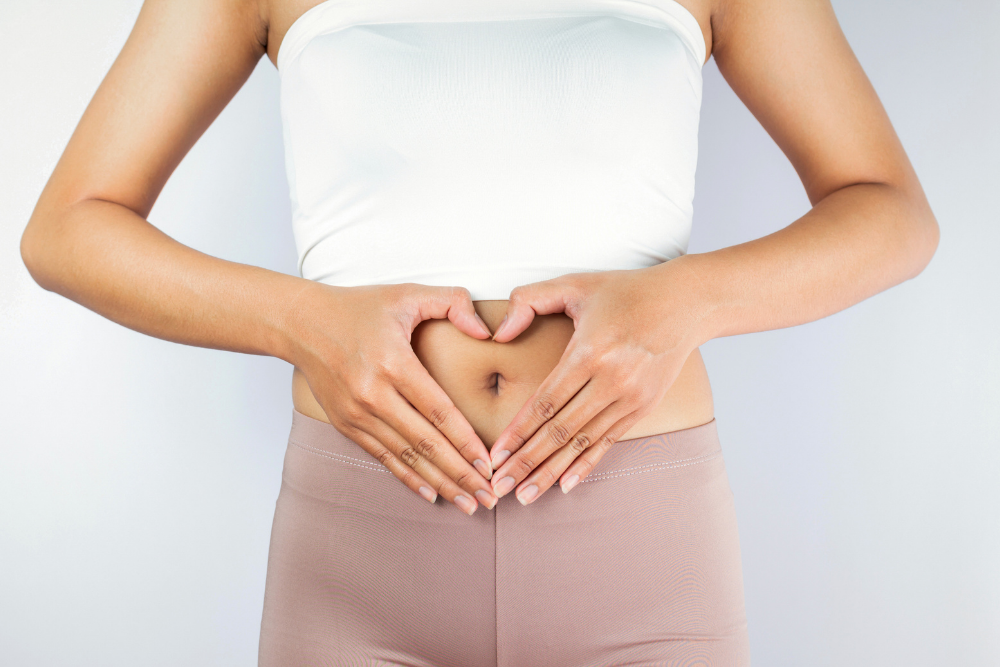
This post lists 11 things I did to put my celiac disease symptoms into remission. This is my personal experience as a patient of celiac disease and as an IIN-trained Integrative Nutrition Coach. Please discuss any changes to your diet with your doctor and health care provider. This post contains affiliate links. Please read my disclosures.
Healing from celiac disease is difficult and requires a specific treatment protocol that includes a gluten-free diet and so much more.
I’m living proof that it’s possible to heal your body from the damages caused by celiac disease because I have put my celiac disease into remission.
Ten years ago, a blood test, followed by an endoscopy and biopsy of my small intestine, confirmed I had celiac disease.
However, in the years following my diagnosis, I’ve taken two blood tests to see if celiac disease was detectable in my body. Both tests came back negative. I have officially healed my body from the damage caused by celiac disease.
Please note that when I say I healed from celiac disease, I don’t mean that I no longer have celiac disease or that I’m “cured” of the disorder. Celiac disease is a lifelong condition with no cure and few promising treatment options beyond a gluten-free diet.
I will always have celiac disease, and I will always have to eat gluten-free. I will always have to go through great efforts to avoid gluten, a protein found in wheat, rye, and barley, at all times. I will always need to avoid gluten like the plague.
What it does mean, however, is that I have put my celiac disease symptoms into remission. I proudly live a symptom-free life because I follow a strict gluten-free diet and eat as healthily as possible.
Of course, I indulge in gluten-free treats, but 90 percent of my diet is filled with good-for-you gluten-free foods.
Please note that anyone who says they have “cured” themselves from celiac disease is not an expert you should be looking to for advice. There is no cure for celiac disease.
Read about how I broke up with gluten and healed my broken body in my book, Dear Gluten, It’s Not Me, It’s You, now available on Amazon.
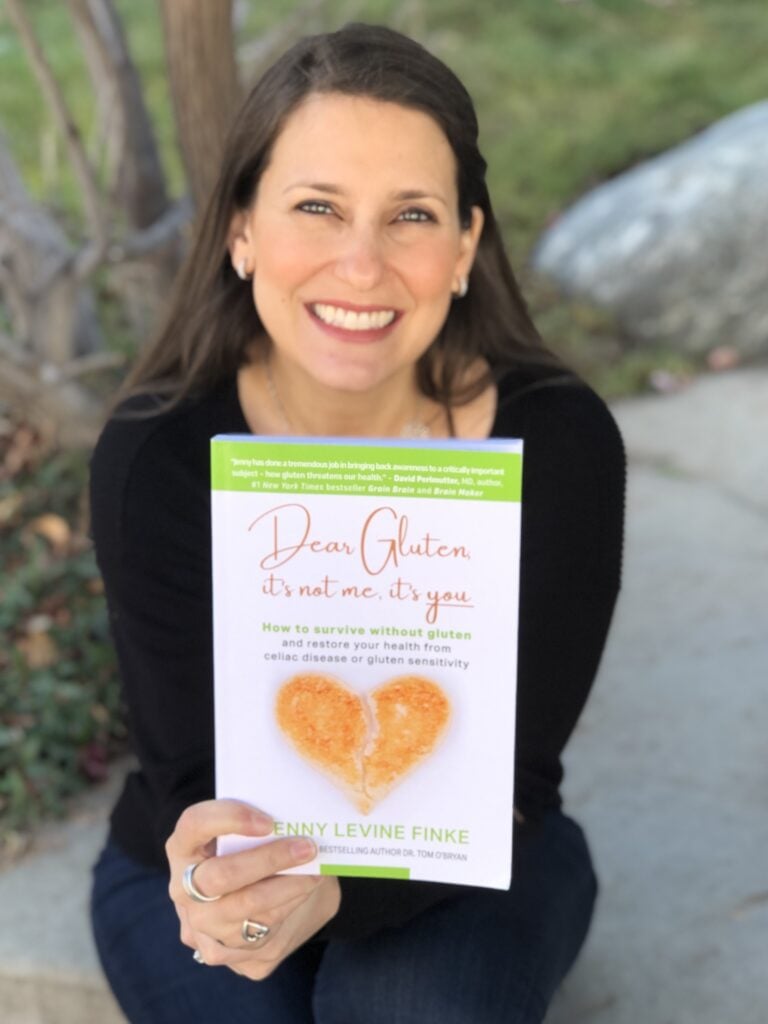
What Is Celiac Disease?
Before I share the 11 things I did to heal my body from the damages caused by celiac disease, I’d like to discuss what celiac disease is and how it affected my body.
Celiac disease is a genetic autoimmune disorder that causes widespread damage to the digestive system. It impairs the body’s ability to absorb nutrients from food properly.
The microvilli, or the hair-like follicles surrounding the small intestine, become flattened and damaged. Most people don’t realize that the small intestine is the organ responsible for absorbing nutrients from food and then distributing those nutrients to every cell and organ in the body.
By the time someone is diagnosed with celiac disease, the small intestine has experienced extensive damage and begins to negatively affect not only digestion but a slew of other bodily functions.
It’s why there are hundreds of symptoms of celiac disease, from skin disorders, canker sores, joint pain, brain disorders, hair loss, thyroid dysfunction, fertility issues, and more.
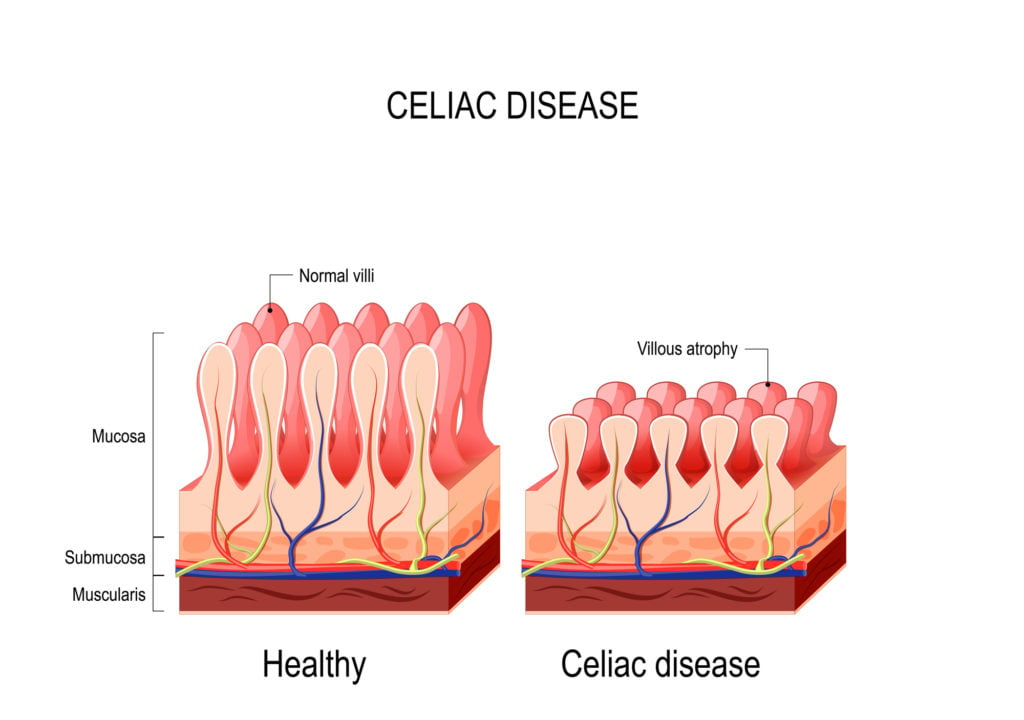
Most doctors tell their newly diagnosed celiac disease patients to go gluten-free, and “eventually” they’ll feel better. This is a half-truth because while the gluten-free diet will stop fueling the flames of inflammation, it can take years for the body to heal fully.
Unfortunately, most people with celiac disease never go on to experience full mucosal (gut lining) recovery, according to this study.
Because many people don’t know that celiac disease is the underlying cause of their disorders, or they have silent celiac disease, they can go years without a proper diagnosis. In fact, it takes an average of 6-10 years for someone to get a proper celiac disease diagnosis from the first onset of symptoms.
How Celiac Disease Affected My Body
Celiac disease was the underlying cause of my severe and painful bloating and embarrassing gas, which prompted me to discuss my symptoms with my doctor.
At the time, I had no idea that a single food group could make me feel so sick, and I, of course, blamed everything but gluten for my chronic bloating.
I’ve since learned that gluten is a catalyst for a leaky gut. Gluten causes the tight junctions, or the cells that line the small intestines, to loosen so much so that they allow undigested food molecules to “leak” out of the gut and enter the bloodstream without first having been properly digested.
These food particles then cause the immune system to go into attack mode; after all, random particles are floating around in the body!
People with leaky gut experience inflammation at a genetically weak spot in their body, which can vary from person to person. This weak point could be the thyroid, small intestine, skin, brain, joints, etc. It depends on the person and where they are most genetically vulnerable to disease.
This explains why I not only experience chronic bloating and gas, but also random migraines, red skin bumps along my arms, geographic tongue, canker sores, nutritional deficiencies, and fatigue.
Why Removing Gluten is Only Step #1
After I was diagnosed with celiac disease, I only felt marginally better. I still experienced chronic bloating and gas, and I didn’t understand why since I was doing all the right things (or so I thought I was).
My doctor told me to eliminate gluten, and I did, so why was I still experiencing these nagging symptoms years after my initial diagnosis?
I started to read books and search for articles online. I also enrolled in a nutrition training program.
Soon after, I realized that while I had fully removed the irritant (gluten), I did little to heal the wounds left behind. My gut was in shambles, and I hadn’t done anything to repair it.
The way I looked at it, all I did was remove the knife from my gut, but I didn’t take any time to nurture the wounds and deep scars left behind.
Unfortunately, most doctors have not studied gluten disorders in earnest, and most doctors have taken only one nutrition class in all of their medical training.
I don’t say this to be mean to doctors; I say this to help you understand that your doctor may not know what it will take to heal your body because it requires more than a prescription for a gluten-free diet to do the trick. You must think beyond the gluten-free diet if you ever want a chance at healing.
My SIGNATURE Gluten-Free Course can help you learn the fundamentals of a gluten-free diet and heal your body in the aftermath of a celiac disease or gluten-sensitivity diagnosis. Learn more about my SIGNATURE Gluten-Free Course and 1-to-1 Coaching services here.
Healing From Celiac Disease is Possible
I know first-hand that healing from celiac disease is possible, and it requires a strict gluten-free diet AND some broader nutrition and lifestyle changes.
Below I share my personal celiac disease protocol so you can see what I did to heal my body and put my celiac disease symptoms into remission beyond a gluten-free diet.
I go into greater detail about my healing journey in my book, Dear Gluten, It’s Not Me, It’s You, which I hope you’ll read too, and in my SIGNATURE Gluten-Free Course.
Remember, there is no magic pill, vaccine, or surgical procedure to heal celiac disease. The way to heal your body starts with the food at the end of your fork.
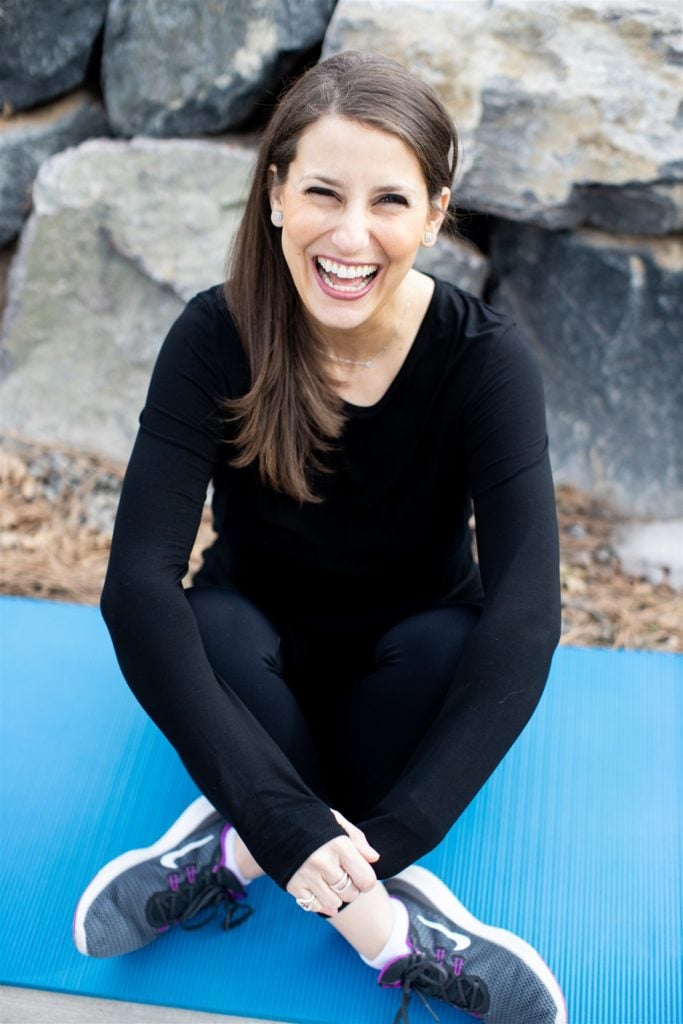
11 Strategies I Employed to Heal From Celiac Disease
Following are the 11 strategies I implemented to heal from celiac disease and put my symptoms into remission beyond a gluten-free diet…
(1) What you take out is as important as what you put back in
A gluten-free diet isn’t only about what you take out of your diet; rather, it’s also about what you put in your body that counts. While you must go gluten-free as a first step to healing your body from celiac disease, it’s only the first step in your healing journey.
If you only go gluten-free and do nothing else, it will be a slow slog toward recovery. I see people struggle with this every day!
Once you start eating whole foods, unprocessed foods, and a slew of naturally gluten-free foods that don’t come with a label (think avocados, apples, and eggs), only then will you begin the road to a more speedy recovery.
Remember, taking out gluten is important to stop the damage, and putting good stuff back into your body is just as important if you want to accelerate the healing process.
Check out my list of 200+ Foods You Can Eat on the Gluten-Free Diet to get started and my healthy meal plans and recipes.
(2) Rest your digestive system
If you break your leg, you rest it, right? You don’t run a marathon, plan a ski vacation, or even take your dog for a long walk.
Now apply this same logic to healing your digestive system and gut. If you want it to heal, think about ways to rest your digestive system.
A few resting strategies I employed include:
Green Juicing: Swap one meal or snack for green juice. This will flood your body with essential nutrients without making your digestive system lift a finger.
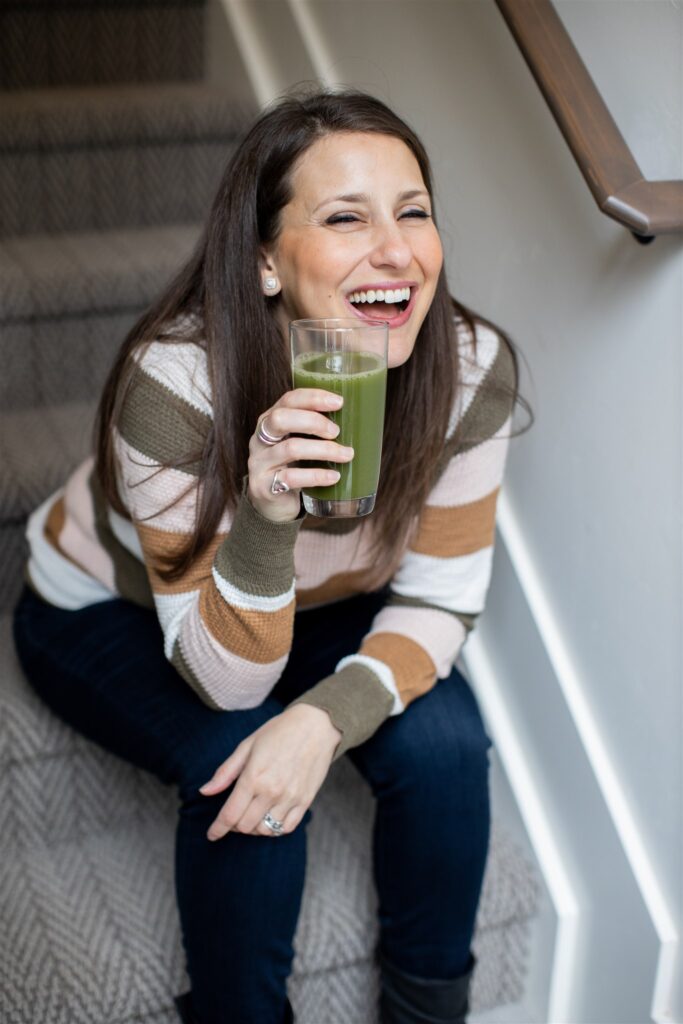
Bone Broths: Another way to get nutrients your body needs without making it work hard is by drinking bone broths.
Bone broths are loaded with essential vitamins, trace minerals, and collagen (a protein that contains amino acids essential for strengthening your bone, connective tissue, and skin), among other benefits.
This is a stack of homemade bone broth I made to nourish my body all week long!
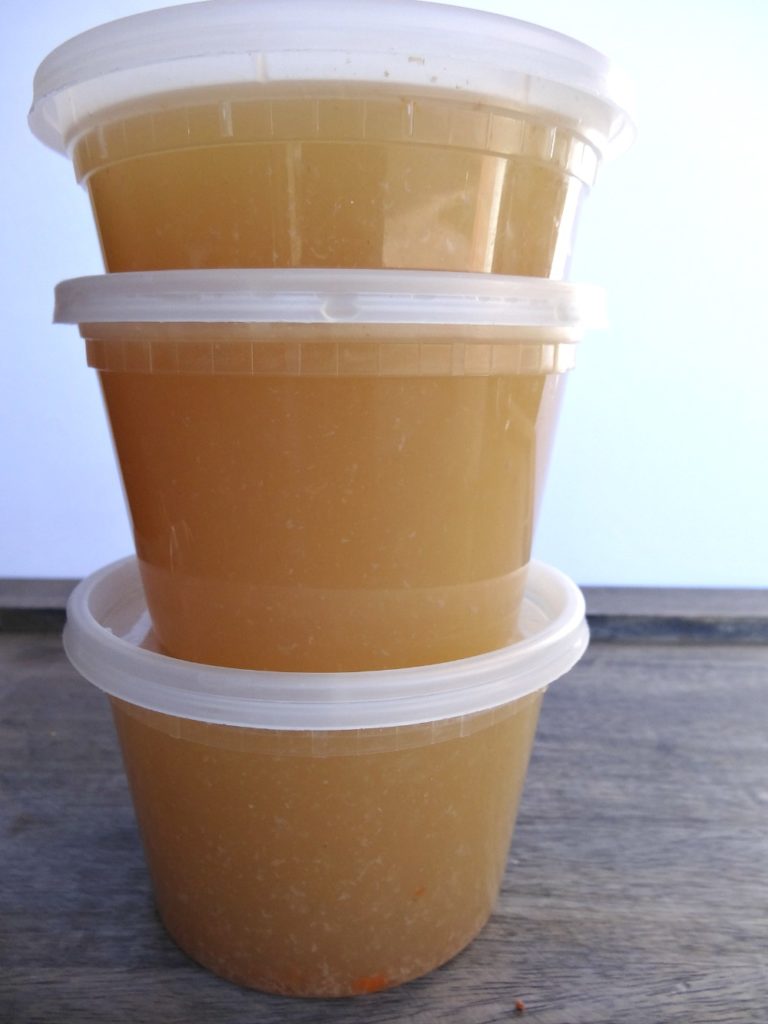
Intermittent Fasting: Another way to rest your digestive system is to employ intermittent fasting… just don’t go over-the-top crazy with fasting.
I fast daily from 7 pm until 7 am. This allows my digestive system 12 hours to digest, rest, and restore itself so it’s ready to work the next day. All digestive systems can use a little downtime, even yours, especially if your body is in the process of healing from celiac disease.
Limit Acidic Foods: Acidic foods (meat, dairy products, grains, carbonated sodas, etc.) are hard to digest and should be avoided as much as possible during the healing process.
Instead, eat alkalizing foods, such as fresh vegetables and fruits, and drink plenty of water, to help maintain a slightly alkaline pH balance in your body.
(3) Add key supplements
I believe you can get most of the nutrients you need from food. However, there are some nutrients that you either can’t get from food or you can’t get in a large enough quantity from food.
This is why I recommend you take some key supplements for celiac disease. I list all the supplements I take – and recommend – in my article titled, Supplements for Celiac Disease and Gluten Intolerance.
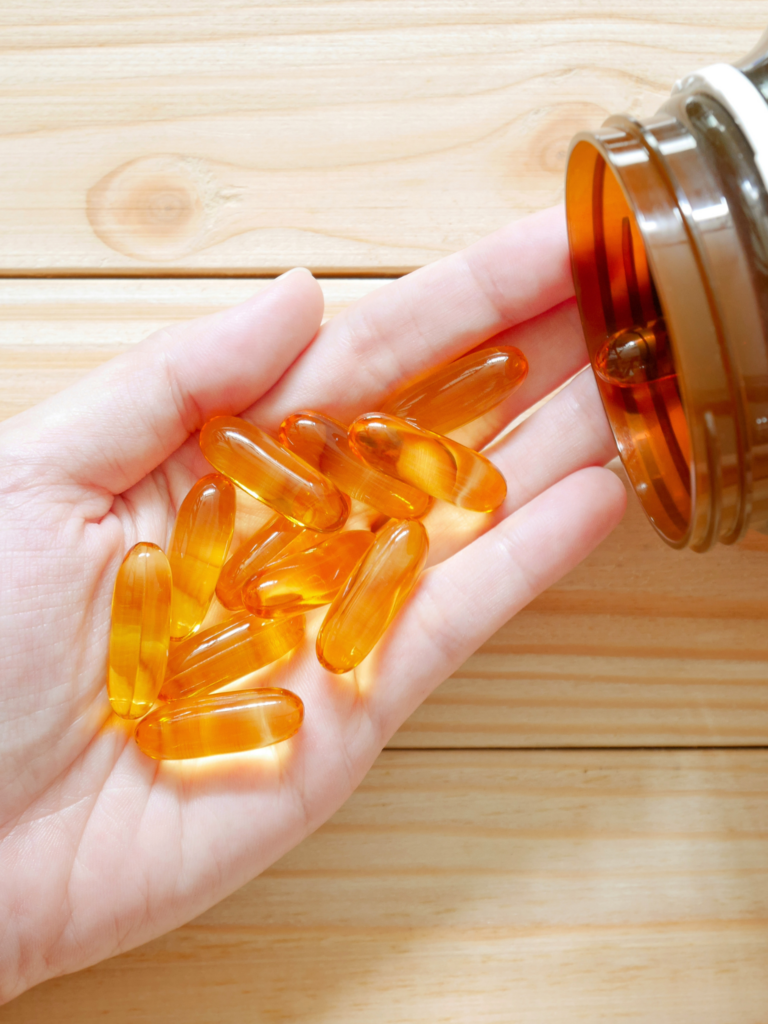
(4) Limit packaged foods
Just because something is labeled “gluten-free” doesn’t mean it’s good for you. And while some packaged gluten-free foods are made with clean, quality ingredients, more likely than not, if it comes in a box or bag and you find it on the shelves at your grocery store, it’s void of nutritional properties.
While it’s always important to decode a food label for hidden gluten, it’s also important to read nutrition labels. You may find that while you’re avoiding the offending gluten protein, you’re now eating excessive sugar in the form of white flour and starches.
Furthermore, many people on the gluten-free diet wind up with a new set of nutrient deficiencies when they go gluten-free because they’re eating a diet heavy in packaged foods. Read my article, 5 Dangers Associated with the Gluten-Free Diet, to ensure you’re doing gluten-free right.
(5) Limit sugar
Chances are your sour tummy woes aren’t just caused by gluten but also are caused by unwanted bacteria and yeast taking up residence in your gut.
You might have a belly full of bad bacteria and yeast wreaking havoc on your health by creating excessive gas, bloating, candida, SIBO, and/or other digestive discomforts.
Guess what feeds and grows yeast in your belly? It’s sugar, both in the form of added sugar – both white flours and starches that convert to sugar in your body.
The bacteria and yeast in your belly send signals to your brain to encourage (or demand) that you eat more sugar so they can thrive and proliferate.
However, when you limit your sugar intake, you begin to starve the bad bacteria of what they desire most, and the bad guys eventually die off. And you can replace the bad bacteria with good bacteria via a good probiotic supplement.
(6) Take a high-quality probiotic
In addition to limiting sugar, I encourage you to take a daily probiotic. A probiotic will help to repopulate the gut with beneficial bacteria and crowd out the bad bacteria.
I recommend taking a probiotic with at least 50 billion CFUs or higher, although you can decide the exact dosage with your nutritionist or doctor. Take one daily, and don’t stop, even if you feel better.
For more information on selecting the right probiotic and for a list of gluten-free probiotics, read my article, The Benefits of Probiotics for Celiac Disease (and a list of gluten-free probiotic brands).
Avoid getting your probiotics from sugar-laden products like Yoplait Yogurt, GoodBelly Probiotic drinks, or Tropicana Probiotic Juice, all of which contain more sugar than a can of Coke per serving and negate the benefits of your probiotics since the excessive sugar feeds the yeast.
On a personal note, probiotics were life-changing for me, and I felt an immediate and positive change in my gut health. Since then, I’ve also enjoyed eating probiotic-rich foods, such as lacto-fermented pickles or homemade kombucha (fermented tea), both of which replenish my gut with good bacteria.
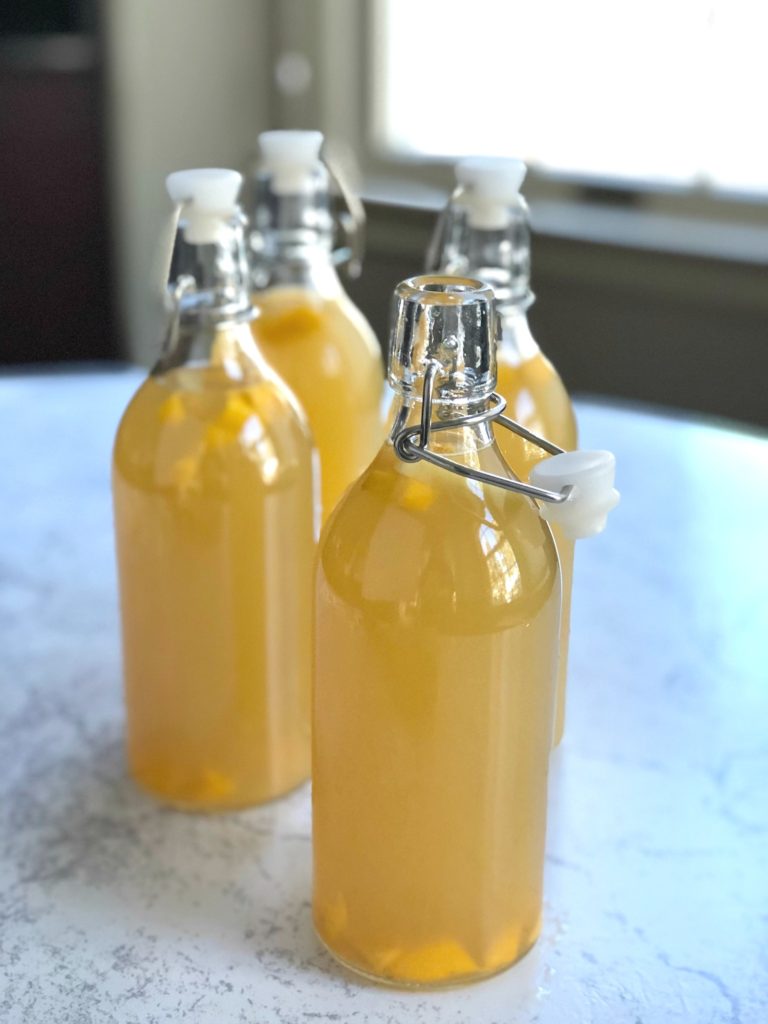
(7) Avoid eating “sick” foods
Genetically modified foods are undeniably linked to illness in our country. Glyphosate (marketed as Roundup) is a powerful chemical that kills bugs but does not kill a genetically modified crop. Chemical residue is lurking on most products you find in grocery stores.
There’s no need to assault your gut with such chemicals. You want to heal, not destroy your small intestine. I suggest you stop eating Roundup-resistant foods and instead buy organic produce, meats, and dairy products when possible.
(8) Be physical
Anyone who has ever recovered from surgery knows that there is little time to rest. The doctor wants you up and about, walking around and in rehab, all with the goal of helping your body recover more quickly.
This is why it’s important to stay active and keep that blood flowing throughout your body. Your body works well when it’s being used and challenged.
If you have a stressful job, consider yoga, meditation, or taking long walks in the fresh air. If you have a job that finds you at your desk all day, consider high-impact workouts like aerobics, HIT workouts, running, and other exercises that encourage you to move your body.
(9) Be social
It’s easy to get depressed and want to go into hiding when you’ve been diagnosed with celiac disease. For a long time, I was scared to eat at restaurants or friends’ houses.
However, long ago, I decided I wouldn’t let celiac disease ruin my life. I slowly but surely began making plans with friends, helping them understand how to host me for a gluten-free meal and how to make sure restaurants take my diet seriously.
Being social and living my life (which meant going out to dinner occasionally) made a huge difference in my mental and emotional healing.
If you sit at home and feel sorry for yourself, you’ll muddle in your disease and become depressed. But if you live your life and show celiac disease who is boss, you’ll heal faster and be stronger both mentally and physically, in the end.
(10) No cheating
Too often, people with celiac disease (and more often with individuals with non-celiac gluten sensitivities) cheat on their gluten-free diet. They say things like, “A little gluten won’t bother me.” Spoiler alert!
When you cheat, cheating hurts your chances at healing, plus you’ll feel awful, die earlier, attract disease in your life, and no one will take your request for a gluten-free meal seriously again.
If you’re concerned about inadvertent gluten consumption, you can check your urine or stool for gluten using these at-home tests from Gluten Detect.
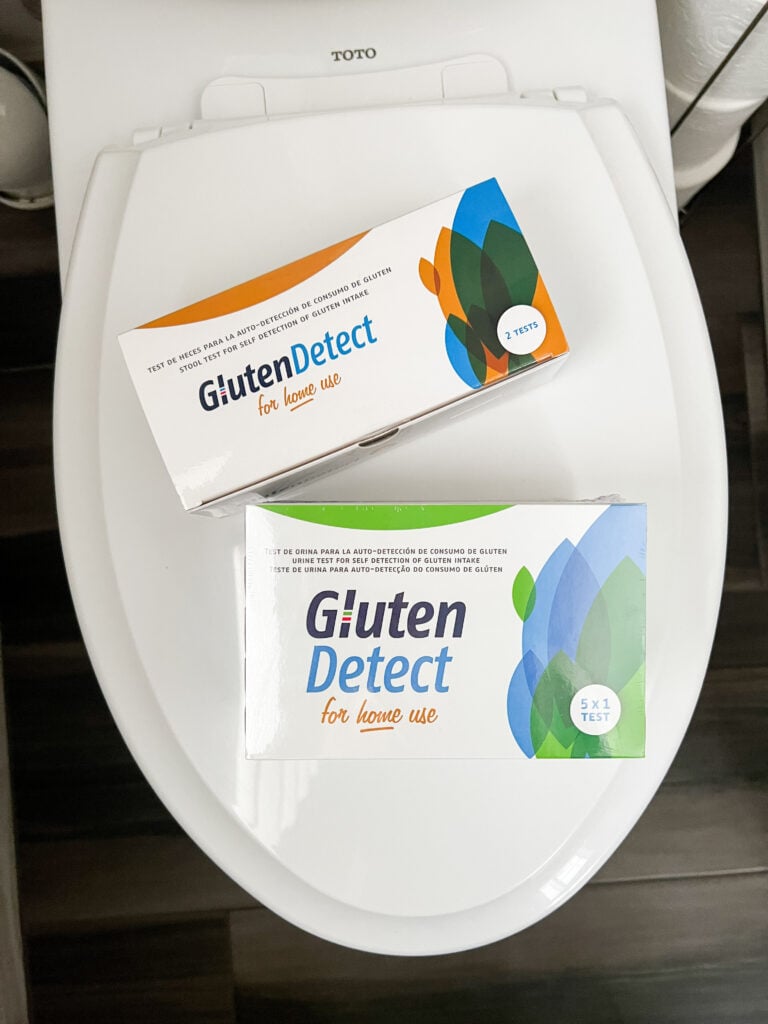
(11) Take digestive enzymes
If your gut is in shambles and you’re struggling to feel well after every meal, consider taking a gluten digestive enzyme before any meal.
Enzymes can help you better digest your food, and with time, you can wean yourself off of them or only take them when you’re eating out and worry about the potential of gluten cross-contamination.
Read more about the pros and cons of digestive enzymes in my article, Do Digestive Enzymes for Gluten Work?
Are You Still Feeling Sick?
If you’ve been on the gluten-free diet for a while, and you’ve implemented the healing practices discussed in this article, and you still don’t feel well, please talk to your doctor and health care team to uncover if something more is at play, or feel free to set up a 1-on-1 celiac nutrition coaching session with me.
You might have a serious case of candida, SIBO, mold/toxic exposure, hormone imbalance, thyroid issues, or another condition requiring medical intervention.
You might also be doing gluten-free wrong. The gluten-free diet can lead to other kinds of nutritional deficiencies and lack of fiber, as well as put you at risk for a slew of other serious diseases and heavy metal exposures.
Are You Ready to Accelerate Healing?
Healing from celiac disease is possible, but it requires effort on your part because it takes patience, know-how, and a commitment to changing your diet and lifestyle for the better.
That said, I’m living proof that a gluten-free and healthy diet can work.
While I won’t eat gluten, the truth is I still eat my fair share of gluten-free cookies and gluten-free pizza. But you know what? The reason I can have these foods now is that I’ve put in the hard work upfront to heal my body.
My gut is sealed and healed. I’ve overcome my addictions to gluten, sugar, and fast food. I constantly load my body with healthy foods. I still love green juices. I cook at home often and enjoy meal planning.
Achieving diet perfection should never be your goal; rather, the goal should be to heal your body so you can take back your life, live disease-free, rebuild your immune system, and enjoy a sweet treat when you want to without being overcome with sickness.
The gluten-free lifestyle is about balancing dietary vigilance with your mental health and not letting it control your life.
You’ll find that your digestive system will strengthen with time, and you’ll become more resilient to inevitable accidental gluten exposure.
I wish you much success in your adventures in healing from celiac disease. If you found this article helpful, please leave me a comment and share your “healing” story.
Additional Reading
- Can You Be Too Gluten-Free? How to Balance Dietary Vigilance Without Losing Your Mind
- How to Get Tested for Celiac Disease (and At-Home Celiac Test review)
- Gluten Detect Urine and Stool Test Review (formerly Gluten Detective)
- Got Gluten Belly? Take the 7-Day Heal Your Gut Challenge
- Understanding and Testing for Gluten Sensitivity and Gluten Intolerance
- Can Celiac Disease Kill You?
- 12+ Must-Read Books about Celiac Disease and Gluten-Free Living
- Gluten and Celiac Disease Weight Gain: Causes, Myths and More
- How Do You Monitor the Effectiveness of the Gluten-Free Diet in Celiac Disease?
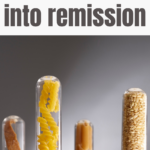
I was diagnosed via symptoms and biopsy only in 2005. I started the GF diet right away and my years of classic symptoms disappeared virtually overnight. It took about 6 months for the gut to heal and my under-weight condition to return to a healthy level. I was 100% compliant and the results showed. My Celiac is in complete remission and I have had a least 2 follow-up blood draws since that were both negative. I have no doubt that the properly administered diet works. My only concern is why this very effective treatment is so discouraged by the medical profession as a first step in the diagnosis. I mean if you have symptoms and suspect it may be gluten would it make more sense to try the diet first and see what happens. If symptoms subside or completely disappear then further testing with the re-inclusion of gluten would seem to make more sense. Just a thought.
I never said I was cured, it’s just that my GFD is working and my body is no longer making antibodies to gluten. This is a great article on monitoring the effectiveness of the GFD. https://www.goodforyouglutenfree.com/celiac-disease-monitoring/
I appreciate you trying to help people. I’m just beginning my celiac journey. One thing that stood out to me in your article is your statement that after cutting gluten from your diet, subsequent blood tests showed you didn’t have celiac disease and you say you “cured” your condition.
My doctor specifically told me not to stop eating gluten until after the test results were returned. If you stop eating gluten the blood test won’t show positive for celiac. Celiac is an autoimmune disease. Without gluten being present, there is no immune response and thus no positive blood test. Perhaps you misspoke in saying your condition was cured? I don’t think you intended to mislead anyone, but it should be noted that there is no cure. You can avoid symptoms and over time heal the damage to your small intestines by avoiding all gluten.
Many people undergo The Gluten Challenge to get a formal celiac diagnosis. However, whether you have celiac or not, it’s apparent you have an issue with gluten and therefore the treatment (gf diet) is the same. It’s probably not needed to do the test but I never want to tell someone what to do. If you feel better without gluten, a diagnosis won’t change a thing. Hope that helps.
There seems to be a lot of confusion about Glyphosate (Roundup).
How it works is: Monsanto sells seeds that have been genetically modified so the crops (they will grow into) will not be affected by glyphosate. Then the farmers who plant them can just spray their field with glyphosate to kill all the weeds without harming the crops.
This is especially attractive to beet farmers; weeding beets is a huge nuisance, which explains why organic foods are almost always made with “cane sugar”: most sugar is now made from beets, but there are almost no non-GMO beets grown in the U.S. anymore.
The problem, of course, is that the crops are also sprayed with glyphosate, and some of it ends up in the foods made from those crops. The FDA determined that it’s safe when used as directed, but there are problems with that: (1) it’s easy for a farmer to use more than the recommended amount, (2) some people are more sensitive than others, (3) much research shows that weeds are getting the GMO genes transferred from the crops, so they’re becoming resistant themselves, and (4) some scientists don’t think the FDA was careful enough in making that determination in the first place (maybe that should have been #1).
I hope this helps (I used to be a science teacher).
Thanks for this very nice resource. I’m 61, and was diagnosed by my General Practitioner around 15 +/- years ago. Reading this helps explain why I still have many Celiac symptoms, though my wife and I are very careful about gluten in my food.
Here’s a problem I don’t think I’ve ever seen addressed; I’m hoping you might have heard (or come up with) something to help: my doc diagnosed my Celiac disease from my symptoms (of the 12 common ones, I had 9), without a blood test or endoscopy. Since I’ve been “off gluten” for so long, chances are a blood test or endoscopy wouldn’t show anything unusual. So the Gastroenterologists I’ve spoken with say I should eat gluten (a lot) for 2 weeks before a blood test, and 3 weeks before an endoscopy to get “correct” results. That sounds extremely unappealing to me. Any ideas would be appreciated.
I really enjoyed reading your article! As someone with a newfound gluten sensitivity, I’ve cut out almost everything in hopes to heal my gut and end the intense pain that follows pretty much anything I eat. Even with cutting out gluten, it seems to not be enough and the pain persist. In a desperate search for new ways to heal my gut I stumbled across your article, and Im so glad I did! Your article gave me new things to try, as well as motivation that it can and will get better! Im definitely looking forward to implementing these new techniques and finally start healing my gut the right way. Thank you again for this wonderful article!!
Hello I am Daphne, I have been a ceoliac for 35 years and never had any problems with gluten free products untill 2018 when I had terrible problems with the bowels, bloating and feeling sick. To cut a long story short I got to the point where I could not eat or drink water, I was down to eating potatoes and vegetables and gluten free bread, went down to six stone, so I decided to stop eating gluten free bread and the bloating stopped. I do feel better and am eating a bit better. I checked all the supermarkets gluten free products and checked the labels and Xamham gum was in them. I read up about Xamham gum and apparently it was invented in 2015, it is grown on wheat, corn and plants so you don’t know which products it’s in. I am a 💯 per cent sure that has caused me so much trouble. I have also looked at so many other ordinary foods a lot contain it. You say yogurts are good for you but they use the gum to thicken them. It’s in some chips, toothpastes etc., I am just unfortunate to have a sensitive gut that cannot take it. I also feel that I am lactose Intolerant and just started to have lactose free milk which is helping me. I am pleased to say that I have put on a stone in five months and am keeping off all additives and stabilisers and eating completely only fresh foods. I have accepted that I will never have a sandwich or cake again.
My hypothesis on the possibilities of Glyphosate being a cause of celiac. And how would Glyphosate get into the wheat.
Wheat needs to dry down completely to be harvested and stored, without developing mold. A wheat field will not germinate in the spring, all on the same day. Some areas will have more moisture to help the wheat sprout/germinate, etc. So in the fall, the entire field does not mature/die on the same day. Some areas may have green spots and will not dry until it dies. By the time the green areas of the field are ready, the areas that died first will start to drop wheat kernels and thud decrease yield. In the old days they made wheat shocks to dry the wheat. Cutting the wheat and drying it in shocks. Then threshing the wheat when it is proper moisture. But what happens if you get a huge amount of rain when it is shocked. You could lose your crop.
One process is to ‘swath’, as in cut the wheat into a windrow and let the wheat, then let it all dry before coming through with a combine. But again, what happens if you have a huge amount of rain? It molds in the field.
So the industry found a way to have the wheat, stand as a single plant and get the entire field to “die” and dry down evenly. If you get rain after the “dry down” starts, the plant will dry in open air as it is still standing as a single plant. How is this down? By using a desiccant to kill/dry down the entire field. But here is the issue. The documentation out there indicates that Glyphosate is seldom used as a desiccant because it takes longer to kill/work as a desiccant. But let us assume that it is used somewhat as it is effective in killing fall weeds and perennial weeds. It takes longer to kill the wheat. But it must be absorbed through the leaves, and remember the wheat kernels are still taking in nutrients if the plant has not died yet. So some of the Glyphosate or what ever desiccant, could find its way to the wheat kernels, through the plants xylem vessels.
Now the debunkers have claims that this is impossible to effect the human gut. And maybe it is.
My other hypothesis is that there is a virus that attacks the body and the body creates the auto immune response creates the celiac condition.
>
Linda said “Round up does not kill bugs as you stated. Round up is a herbicide. It kills weeds. It is not harmful as it is sprayed on the plant that is not consumed. The wheat kernels are consumed, but the kernels are covered by the seed hulls. You need to do a little more research.”
I was going to comment after reading your statement that Roundup kills bugs. I see someone already beat me too it.
I farm. Though I do not raise wheat. I do have experience. (and to those that now think I am hired by “roundup”, it is not a company. And no I do not work for any company which created, sells or manufactures Glyphosate.)
And to those who think Glyphosate is not used in Europe?? It will be banned in Dec of this year. So if less celiac is happening in Europe today; is it because of a ban that will take place in the future?
I think “Linda”, the first commenter, works for Roundup. Roundup hires people to do word searches across sites, btw. Linda, please explain how Americans can travel to Europe and gorge on croissants and pasta and NOT have gluten reactions and when Europeans come to the U.S. they get just as sick as Americans are with SIBO and Leaky Gut. Glyphosate is banned in the EU. The wheat is barely digestible as is (industrial ‘cereal grains’ aren’t REAL foods) and if you add poison to it the problem is exponential.
I admit I do not know everything about Roundup. I understand it’s an herbicide and insecticide. I encourage people to do their own research. I’m surprised to see you come to the defense of GMOs and do not know your intentions, but I can appreciate open, thoughtful and constructive comments.
I found your site because I am looking for info on healing properties of aloe vera. Your site is informational. I had to reply because you also have some false information posted. Round up does not kill bugs as you stated. Round up is a herbicide. It kills weeds. It is not harmful as it is sprayed on the plant that is not consumed. The wheat kernels are consumed, but the kernels are covered by the seed hulls. You need to do a little more research. If you could rid yourself of celiac disease by turning off or removing the gene that causes celiac disease, would you?? Researchers are removing diseases in plants by removing the disease causing DNA. Unfortunately they were named genetically modified and they have received a bad name. I challenge you to do some research into GMO’s- how it’s done, and why, etc. Not from people’s posts but from the research company. Remember that the Food and Drug administration is monitoring the food supply as well as federal and state health inspectors. Farmers have the job of feeding the population. Why would they produce something harmful??
If you’ve been diagnosed with celiac, you’ll always have it and need to follow a Gf diet to control it. You are not cured, just healed. If you go back on gluten your immune system will go back into attack mode. I hope that helps. of course talk with your dr.
Hello, I am interested to know about healing yourself with a gluten free diet. So do you believe that you are healed? I was diagnosed 20 years ago with Celiac (biopsy). I went on and have been on gluten free diet asap, I recently went in for another biopsy and now they tell me I don’t have Celiac?? I know how I felt/feel if I accidently eat anything with gluten in it, so how is that possible? Is it possible I have healed my gut or maybe they didn’t take enough of a biopsy to test? I’m so confused and angry. So now is it ok to eat gluten again? After 20 years???
Thanks so much for this. For the past year I have been experiencing weird symptoms. Headache, pressure, fatigue, acid reflux and most recently body tingling. I visited a wholistic doctor and was given an allergy test. Sure enough I reacted to wheat gluten and yeast. After further research, I discovered that gluten has cross reactors including: dairy, coffee, rice, millet, oats and corn. That’s why you can experience some of the same symptoms because antibodies have identified these things as gluten.
In addition, a lot of people with yeast and gluten intolerances should stay away from supplements that use unnatural ingredients. B-12 as a supplement is yeast based; so is citric acid that is placed in fruit juices and vitamin c supplements.
Thanks for your help and I hope this post helps those who are stil suffering after giving up gluten. Love and light.
Everyone is different. I do believe very restrictive diets don’t work and aren’t successful long term. Eat in a way that feels good to you. I have seen no gluten, low grains, low processed foods, and high veggie work well and feel good.
Hi Jenny… thank you for all the information! I’ve been reading so much, lately, about grain being bad for celiac disease and autoimmune disease in general. Do you still feel that healthy, perhaps organic grain, and of course gluten free grain is ok? I have a few autoimmune issues.
I’m so happy this helps you!!!
Thank you so much, this is all so overwhelming and your words have helped me. I can’t express in words how thankful I am 🙏
I’m glad I could help 😊
Hi, thanks so much for this article. It sheds a lot of light on what’s been happening for me for the past 20 years (at least!). It explains why, after 2 years on a gf diet, my endoscopy results still showed my gut as very inflamed, why I’ve had to give up dairy products, caffeine, and most sugary foods. My budy just can’t handle it. I also feel like I need to eat all the time, though that might be partly comfort eating as a psychological issue. When I was a teenager I suffered from anxiety, depression, and sleep problems, and I’m still feeling the effects of these for sure. I think my coeliac disease came on fast and furious in my teens, it explains a lot of the problems I wa shaving at the time, both mental and physical. I think if more people knew that it’s not just a case of’ ‘give up gluten and you’ll be better’ people who suffer from it might be given more support. I had a very hard time as a teenager, and coeliac disease definitely had its part to play in that. I wish I knew then what I know now. Thanks so much for your very insightful and informative article. I feel very justified.
I don’t know enough about it. It’s not a “scheme” but it is a MLM product. I feel better taking it but am far from an expert. It helps eliminate free radicals in the body.
Hello!! I was interested in the supplements portion of your post. I currently take vitamin D and a multi Vitamin B (which includes B12). I went to research Protandim to purchase it and found that it is a multi level marketing scheme (pyramid scheme). Science shows that it demonstrates placebo effects, but no legitimate effects. The side effects on the LifeVantage website also include gastrointestinal disturbances (including vomiting, stomach pains, and diarrhea), I don’t understand why it would be recommended for someone with celiac disease attempting to decrease inflammation and decrease stomach pains.
I have lots of juice recipes. Search using the search toolbar on my site 😉
Thank you, for your article. I was wondering what you recipe is for green juice? I recently discovered I have celiac and I want to heal my self and stay healthy.
Thank you,
Angela Hayden
Thank you for your kind words. Check the label of your coffee to make sure it’s GF. Is it all coffee or one brand? It could also be caffeine bothering you. I actually quit caffeine and I feel better (less jittery).
Thanks so much for sharing your story and how you were able to overcome your symptoms. I am hoping this will help me.to start to feel better. I was just recently diagnosed with ciliacs at age 30 and I have very Sevier symptoms.
Do you have any thoughts on Coffee? I have cut my coffee consumption down to one cup a day but I find my symptoms are really bad after I have a cup of coffee. Is coffee something that can flare up my.symptoms?
It is so hard to say as everyone heals at a different rate. It could be a cross reactive food? That’s just a guess.
Hi. My name is Jeanette. I am 31. I have celiac. And been gluten free for about 3 years now. I been making sure everything I eat and use are gluten free. I call the manufactures about everything I eat and use. I use my own cookware and silverware. And wash them all separately. I don’t eat out and try and eat whatever is certified gluten free or if it says gluten free I would make sure its safe. I been doing everything I can to be safe.
My recent TTG IgA (0.0-6.9) units/mL
Results were 1.9 units/mL.
So I’m still getting gluten somewhere and I don’t know what to do. Any advice you could give me. Thanks.
Feel free to contact me through my contact page.
I have been diagnosed with Celiac Disease since 1994. I really enjoyed reading your post. I need more information on a few things you mention. I am not good at making comments on Public Post but would really like to hear from you and get advise on a few things.
This is something every newly diagnosed Celiac needs to see. My 15 year old son was finally diagnosed after getting sicker and sicker for FOUR YEARS. His GI Dr. was so proud of herself for diagnosing him (after WE insisted on blood tests and a scope). They had us meet with a nutritionist who basically taught us how to read food labels. That was it! By the time my son was diagnosed, he was missing school and sports constantly, was behind in school and suffering terribly from anxiety and depression. She also did not address the importance of the mind/gut connection and how Celiac is connected to mental health issues. Sadly, we were so focused on the physical part of “fixing” his GI issues, we didn’t get to the mental health component until about a year after his initial diagnosis. His Dr. had zero resources for us beyond “stop eating gluten”. The entire family immediately went gluten free, but I had to dive in to research myself. Besides a strictly GF/DF diet, he supplements with: liquid turmeric, pre/probiotics, anti inflammation supplements, B12, and I’m looking into CBD oil for anxiety/sleep disorder. It’s been a year and a half since his initial diagnosis and he’s a completely different person. It’s like we’re getting our boy back! Keep doing what your doing to get the information out there!
Thank you!
Loved your article, it’s so exhaustive and covered all aspects of celiac disease. Thanks.
Phyllis B, I am new at this too. I was diagnosed with celiac a year and a half ago. I also discovered I am lactose intolerant, which often goes along with celiac, due to the damage that has been done to the small intestine. It is not easy to go from “not cooking” , to cooking most of my meals and my family, who are not allergic to gluten and dairy sensitive. There are many wonderful recipes on Pinterest that can get you started. I would suggest some healthy smoothies as mentioned in the article above. Grab yourself a good ninja blender, a crock pot, insta pot, whatever makes cooking quicker/easier, make yourself a Pinterest board, add a few good easy gluten free recipes, and start from there. I found so many new ways to cook without being in the kitchen (except to chop/prep the food) throw it in the oven or cooker, and come back when it’s done. Once you eliminate the gluten YOU WILL feel better, and it all gets easier from there. The whole 30 diet is an awesome elimination diet free of most known allergen foods. It does require some cooking, but you should try it when you’re ready.
Hi Carley I’ve posted several juice recipes on my blog, which you can search for. I also buy cold pressed juices from Daily Greens, Suja, Trader Joe’s etc.
What are your green juice recipes? I’m 22 and I found out 1 year and 1 month ago I have celiac disease. I was told the same, to just take gluten out of my diet. But I did more research and that’s not the case. After I cut it out I still had bloating, gas, constipation, diarrhea, migraines. I cut out lactose because it was irritating my stomach and cut out boxed/processed foods. I still have processed foods sometimes but not often. I have swollen lymph nodes I got 2 surgercally removed because they thought I had a hernia from weightlifting. Doctors have not been helpful over this journey. I have helped my own body from my research rather than the doctors… and you saying they only have to take 1 nutritional class is absolutely absurd… What are your juice recipes you use for healing? Also what are all foods you cut out of your diet? I’m still having trouble with bloating and gas, it feels like I’m burping all the time! What can I do to help that? What do you think is causing that still? Thank you for all your help! I truly truly appreciate all of this! It has helped tremendously! Best regards, Carly
I think this is all good but misleading. Someone who has been on a strict Gluten Free diet for even a few months will product negative blood test results (meaning no evidence of Gluten intolerance state or damages). I’m not a medical professional but my daughter has had Celiac for years and we’ve go the gamut with Cincinnati Childrens Hospital specialist teams (who are top ranked but also among a short list of leading immunology centers worldwide). I’m glad you said you are not a professional either but I do think you should provide a better disclaimer or footnote about testing. Glad you’ve minimized or eliminated your symptoms – THAT truly is the win for lifestyle improvement NOT necessarily what a test says – as the tests can produce false or misleading results. May you keep healthy and symptom free into 2019 and beyond!
Glad it worked for you. Congrats!! The vast majority of celiacs do not heal and some of us need a bit more help.
Although I will always be coeliac because there is no cure, I’m healthy and all I had to do was follow my doctors simple instruction to go gluten free. Two years later and my gut has healed and I’m well again. That’s all I did. Simple, effective and it changed my world.
Thank you!
Your information about Candida is eye-opening! It makes perfect sense. Thank you!
I hope you figure out what’s ailing you. Hugs.
After 8 months of diarrhea and a loss of 40 lbs.,seeing 3 doctors, one being an alternative Dr., and 3 nurse practictioners, along with 2 different stays in a hospital with low potassium, thyroid and a weight of 99lbs. (usually I’m 140–150) The test for celiac was performed. That was 5 days ago.(December 22, 2018). I’m home now reading about GF diets, celiac, etc. I am quite confused and somewhat depressed about the whole situation. I am not a cooker, nor have I ever loved to cook, except for breakfast, I just do not know what to eat, and most of the time am not hungry.
I will of course figure this out, but right now, with my energy level still low, I’d rather just crawl into bed and sleep!
Help….
NO, I never eat gluten and never will. It would just damage my body all over again. But I can enjoy gluten-free cookies and pizza on occasion, without feeling sick from all that sugar. I will take a closer look at my post and clarify. Thank you for asking this.
Hi, Jenny! Question about the last paragraph of the article… when you say your body is healed enough that you can handle occasional cookies and pizza, you’re talking about “regular” cookies and pizza, right? Not gluten-free?
I’m new to the autoimmune scene, and my doctor has me working through an excellent book, but this article is practically a CliffsNotes of it! Thanks for the short, easy-to-digest (pun intended) article.
Please do feel free to share the link. Thank you.
How can I share this blog?
Hi Adriana I’m so glad my article could be of help. I cannot give you specific advice but I personally take a vitamin d and b12 daily. Most people don’t get enough of either vitamin with or without celiac.
Thank you for this wonderful article. I have psoriasis and also celiac disease. Both of these have diseases feed off of each other.
In order to get my body to heal, I listen to what my body needs. If I feel like I need more fiber I eat more veggies, dry skin- drink more juices etc.
I take a multi vitamin 4 times a week. Do you think I need to include an additional vitamin D and B?
Excellent Article!
Yes because it’s a fermented food and will feed good bacteria and help the probiotic flourish in your belly. I personally don’t use kefir bc I don’t like the taste of milk products and I limit dairy.
Is kefir allowed on your program
Thank you for your comment Melissa. You made my day and I’m glad I could shed light on this.
Thank you for writing this article. I have mentioned to several doctors including GI doctors that going gluten-free is not good enough to heal celiac disease. I’ve been told by several of them that I’m wrong and that’s exactly what you do. But Common Sense would say that if you have damage to your gut that you need to heal it also. I love, love, love this article thank you so much for writing it.